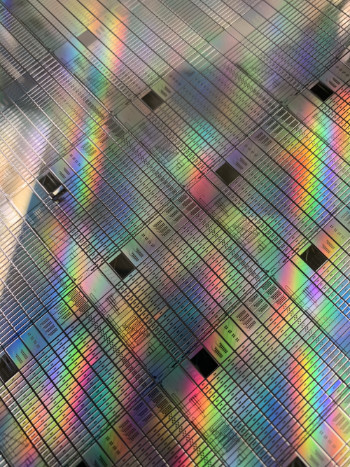
Rochester researchers are developing an optical chip on a disposable card that can detect exposure to multiple viruses—including the coronavirus that causes COVID-19—within a minute and from a single drop of blood. (Courtesy of the Miller Lab)
Researchers in Rochester are developing an optical chip on a disposable card that can detect exposure to multiple viruses within a minute—including the coronavirus that causes COVID-19--from a single drop of blood.
Led by University of RochesterMedical Center researcher Benjamin Miller, the $1.7 million project is funded by the US Department of Defense Manufacturing Technology Program using CARES Act funds through a contract with AIM Photonics. The collaboration also involves Ortho Clinical Diagnostics, which develops and manufactures innovative laboratory testing and blood-typing solutions at its Global Center for R&D Excellence in Rochester; Syntec Optics, a maker of polymer optics in Rochester; researchers at the NY CREATES 300mm microelectronics research facility in Albany, New York, and at the University of California at Santa Barbara; and the Naval Research Laboratory in Washington, DC.
"This is a completely new diagnostic platform," says Miller, the Dean's Professor of Dermatology and a professor of biomedical engineering, optics, and biochemistry and biophysics. "We think this is going to be valuable in very broad applications for clinical diagnostics, not just COVID-19."
Key to the technology is an optical chip, no larger than a grain of rice. Proteins associated with eight different viruses, including SARS-CoV-2, are contained in separate sensor areas of the chip. If someone has been exposed to any of the viruses, antibodies to those viruses in the blood sample will be drawn to the proteins and detected.
Antibodies are proteins produced by the immune system to fight off specific bacteria and viruses. They remain in the immune system even after a patient recovers from an infection.
"It is exciting to see the sensors work developed by AIM Photonics, over the past five years, now play a part in more effective testing for COVID-19 and future diseases," says Michael Cumbo, CEO of AIM Photonics. "The industry, academic, and government partnership is a fundamental piece of this institute. Together, we foster successful technology developments such as this optical chip, which in turn enables a very innovative diagnostic platform."